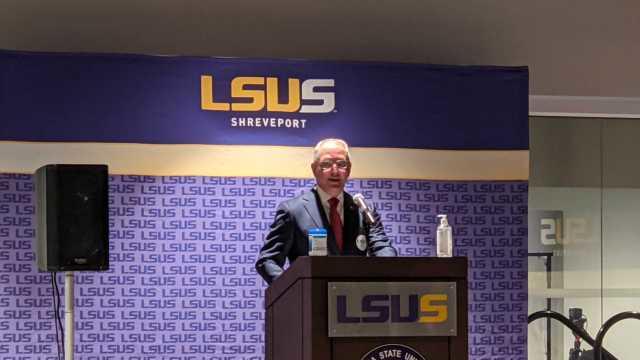Gov. John Bel Edwards and Chancellor Larry Clark of Louisiana State University Shreveport on Tuesday announced a more than $3 million agreement to advance student careers in technology.
According to details released by the governor’s office, Louisiana Economic Development will contribute $1.2 million and LSUS will contribute $2 million through a Cooperative Endeavor Agreement to build a next-generation learning environment, one that advances technology through all degree programs at the fastest-growing university in the state:
The CEA follows an additional investment of $750,000 by LSUS to create a Design-Thinking Lab and a 10,000-square-foot Cyber Collaboratory, which was dedicated at today’s announcement and is central to the technology agreement. Through these creative learning spaces, LSUS students will build skills in high-demand careers, support K-12 students and teachers, and also collaborate with industry on solving real-world problems.
“Our administration is committed to ensuring that all our young people have ample access to the tools, programs and training needed to compete in today’s marketplace,” Gov. Edwards said. “I am proud to have worked with both LSU Shreveport and LED to create this opportunity, and to further strengthen the success of the I-20 Cyber Corridor. Under his leadership, Chancellor Clark has placed LSU Shreveport on a path of sustained growth and excellence, and this agreement is the latest initiative to foster growth at the university.”
The CEA covers four years through the 2023-24 academic year, and comes after LSUS welcomed a record 9,995 students to the university for the Fall 2020 semester. Despite the COVID-19 pandemic, LSUS posted a 16 percent enrollment increase over Fall 2019, making it the fastest-growing college in Louisiana. The technology agreement will expand STEM academic curricula – such as computer science, analytics, data visualization and cyber systems – and target a 70 percent increase in freshman-application interest for those programs.
“LSUS thanks Governor John Bel Edwards and LED for the opportunity to partner with LED in its continuing efforts to strategically develop a globally competitive workforce and help build the economies within Louisiana, especially here in North Louisiana,” Chancellor Clark said. “We look forward to sharing best practices that we will develop with industry partners and other colleges and universities of North Louisiana.”
“A multidisciplinary faculty committee is already at work, focused on curricular changes to help prepare all LSUS students to be successful in the 21st century workforce,” said LSUS Vice Chancellor Julie Lessiter, who leads strategic initiatives for the university. “This includes the infusion of new concepts into General Education and strengthening cutting-edge disciplinary fields of importance to Northwest Louisiana.”
LED FastStart®, the nation’s No. 1 state workforce training program, will lead the CEA with LSUS. FastStart will combine the capabilities of LSUS and its relationships with regional higher education peers to advance student success in software, information technology and related science, technology, engineering and math fields.
Those peers include Grambling State University, which received a similar LED grant in 2019; Louisiana Tech University; the University of Louisiana at Monroe; Northwestern State University; Southern University at Shreveport; Louisiana Delta Community College; and Bossier Parish Community College.
Through the CEA, LSUS and LED FastStart will develop enhanced academic programs in technology-driven fields. LSUS will hire faculty members with strengths in design-thinking and data visualization; expand professional development opportunities for faculty in technology integration; hire a STEM admissions counselor to recruit students for high-demand careers; increase scholarships for those high-demand fields; and hire an academic coach in the LSUS Student Success Center to improve student performance.
LSUS also will offer training certificates in these high-demand careers that could range from data analytics, data visualization and artificial intelligence to cloud enterprise, geographic information systems, innovative communications and cyberoperations.
“We are excited to have this $3.2 million investment infused into LSUS,” Shreveport Mayor Adrian Perkins said. “This will go a long way in building the technology talent in our city that can help us attract tech companies to this market. This partnership with Gov. Edwards and Chancellor Clark is a great example of what is possible when we all work together.”
The LSUS technology agreement is the latest in a series of milestones along the I-20 Cyber Corridor in North Louisiana. Highlights include establishment of Louisiana’s first Tier III data center, the EATEL Business Data Center in Shreveport; the National Governors Association biennial cybersecurity conference in Shreveport led by Gov. Edwards in May 2019; groundbreaking that same month for the $71.8 million Barksdale Air Force Base access project at I-20 and I-220, which will provide a direct link to the 3,000-acre National Cyber Research Park; and establishment of the Northwest Louisiana Cybersecurity Council in July 2019.
In October 2019, Gov. Edwards announced funding for a new $15 million Tech Pointe II commercial building on Louisiana Tech’s Enterprise Campus that is projected to generate 750 new jobs over the next decade. In November 2019, he announced a $10 million headquarters facility for the Louisiana Tech Research Institute at the National Cyber Research Park, with an additional $1 million from LED for every $3 million in federal and private research attracted in each of the next three years.
Other I-20 Cyber Corridor milestones include the growth of General Dynamics Information Technology employment to more than 1,000 at the National Cyber Research Park and other locations; and the April 2019 announcement that Fortune 500 CenturyLink will retain its headquarters in Monroe through 2025. During the past decade, the State of Louisiana has funded more than $300 million in STEM investments linking economic development project wins with higher education facilities and instruction. Those STEM investments are producing more than 20,000 new technology jobs in Louisiana.
